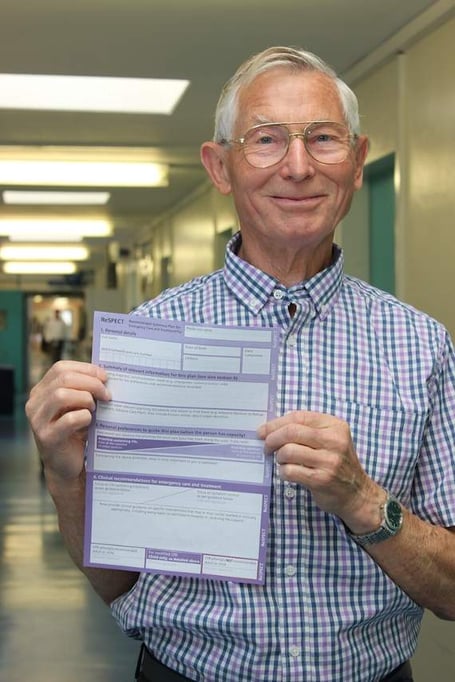“THINKING about the treatment you would and would not like to receive in a medical emergency is incredibly important, not just for you, but for your family too.”
That’s the view of Roy Ford, who has first-hand experience of the difference that considering your options in advance can make.
Earlier this year, Roy’s wife, Janet, was diagnosed with liver and pancreatic cancer. Just days later, and with Janet unable to move, an ambulance was called to the couple’s home.
However, rather than taking Janet to hospital, the ambulance crew made the decision that the journey would not benefit her. Within hours, appropriate care had been set up, allowing Janet to spend her final days at home, where she passed away just a week later.
It was the most difficult time of Roy’s life, but it was made that little bit easier with the knowledge that Janet was at home where she wanted to be and where her family could spend most time with her.
Roy said: “We had never talked much about what we might like to have happen at the end of our lives.
“It was luck and compassion that meant the ambulance crew made the decision for Janet to stay at home. Had Janet thought about this in advance, I know that that is what she would have wanted.”
With patients like Janet in mind, Hampshire Hospitals NHS Foundation Trust has become the first trust in Wessex to implement a process that allows people to have a say in the level of care that they receive in an emergency, even if they are unable to make or express choices at that time.
The process, called ReSPECT, sees a person and their health professionals draw up a plan, which includes clinical recommendations about care and treatment that could help to achieve the outcome that person would want. Treatments that would not help or that the person would not wish to receive are also noted.
The plan is documented on a special ReSPECT form, which the person keeps with them to ensure that healthcare professionals responding to an emergency have all of the information they need to make quick decisions about care and treatment.
Roy said: “I think ReSPECT is an excellent initiative. Knowing that everyone is on the same page and that the decisions are based on not only what you want but are also clinically appropriate is reassuring. It’s not something you often want to think about, but knowing these decisions are recorded and that the right people will see them when it matters takes some of the uncertainty away.”
Alex Whitfield, chief executive of Hampshire Hospitals NHS Foundation Trust, which runs Basingstoke and North Hampshire Hospital, Royal Hampshire County Hospital in Winchester and Andover War Memorial Hospital, said: “We are delighted to be working with our partners at South Central Ambulance Service, in primary care and in nursing and residential homes to implement the ReSPECT process.
“ReSPECT will help to ensure that patients receive the treatment that is right for them and make it easier for healthcare professionals to make the most appropriate decisions in an emergency situation.”
The ReSPECT process can be for anyone, but it is likely to be especially relevant to people with complex health needs, people who are likely to be nearing the end of their lives, and people who are at risk of sudden deterioration or cardiac arrest.





Comments
This article has no comments yet. Be the first to leave a comment.